Time | Agenda | Chairman | |
08:30 – 08:45 | Forum Opening Ceremony | Pro. Zhijun Fang | |
08:30– 11:30 | 08:45- 09:15 | Trends and Challenges in Cyberphysical Systems Design and Control Kolyubin(ITMO University, Saint Petersburg) | Associate Pro. Jian Wang |
09:15- 09:45 | Dynamic Regressor Extension and Mixing: a New Tool to Enhance Parameter Estimators Stanislav Aranovskiy (ITMO University, Saint Petersburg) | ||
10:00– 10:30 | Formation Control and Analysis of Multi-Robot Systems Peng Shi(University of Adelaide, Australia) | Associate Pro. Yuanyuan Li | |
10:30- 11:00 | Improved LMD, Permutation Entropy and Optimized K-Means to Fault Diagnosis for Roller Bearings Wanqing Song (Shanghai University of Engineering Science) | ||
11:00- 11:30 | Distributed Filtering for Sensor Networks Xiu Kan (Shanghai University of Engineering Science) | ||
Introduction of Speakers for Sino-Russian Frontier Forum of Control
Associate ProfessorSergey Kolyubin
ITMO University, Saint Petersburg
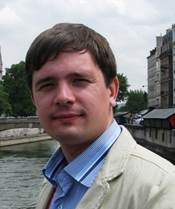 Sergey Kolyubin received his BSc. and MSc. in automation and control (both with honors) as well as PhD in system analysis, control, and signal processing from ITMO University in 2008, 2010, and 2012 respectively. In 2010 and 2011, he was working as a Visiting Scientist for Control Systems Group and Manufacturing Flexibility and Robotics Group at the General Motors Main R&D Center in US. In 2012-2016, he held a Research Fellow position in Engineering Cybernetics at Norwegian University of Science and Technology. In 2015, he was invited as a guest researcher to IRCCyN, France. Currently he is working as an Associate Professor at the Control Systems and Informatics Dept., Research Fellow at the Nonlinear and Adaptive Control Systems Lab. (co-headed by Prof. Romeo Ortega and Prof. Alexey Bobtsov), and Vice-Director for Science and Technology Foresight at the School of Computer Technologies and Control, all in ITMO University.
Sergey Kolyubin received his BSc. and MSc. in automation and control (both with honors) as well as PhD in system analysis, control, and signal processing from ITMO University in 2008, 2010, and 2012 respectively. In 2010 and 2011, he was working as a Visiting Scientist for Control Systems Group and Manufacturing Flexibility and Robotics Group at the General Motors Main R&D Center in US. In 2012-2016, he held a Research Fellow position in Engineering Cybernetics at Norwegian University of Science and Technology. In 2015, he was invited as a guest researcher to IRCCyN, France. Currently he is working as an Associate Professor at the Control Systems and Informatics Dept., Research Fellow at the Nonlinear and Adaptive Control Systems Lab. (co-headed by Prof. Romeo Ortega and Prof. Alexey Bobtsov), and Vice-Director for Science and Technology Foresight at the School of Computer Technologies and Control, all in ITMO University.
Co-author of more than 40 papers for international per-reviewed journals and major conferences. He received a number of awards as a young scientist, including Russian Presidential Fellowship (twice) and FRINATEK Personal Overseas Research Grant from Norwegian Research Council. Co-founder and CEO of xTurion LLC robotics company. IEEE Member (CSS and RAS) since 2010.
Title:Trends and Challenges in Cyberphysical Systems Design and Control
Abstract:The talk is about recent trends, applications, challenges and cutting-edge research efforts in cyber-physical systems (CPS) design and control. We will start from CPS definition and evolution of the field. Various applications, where IT and OT converged, as well as theirs technological and economic impact will be discussed. After we will consider global challenges and related international R&D initiatives. Final part of the talk is about ITMO University on-going research projects in the field.
Associate ProfessorStanislav Aranovskiy
ITMO University, Saint Petersburg
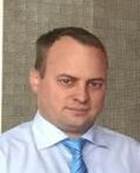 Stanislav Aranovskiy got his Engineer (2006) and PhD (2009) degrees in Systems Analysis and Control from the ITMO University (Saint-Petersburg, Russia), where he was also employed as an assistant researcher till 2012. In 2012-2014 he was a postdoctoral researcher at the Department of Applied Physics and Electronics, Umea University (Umea, Sweden), and in 2014 he got an Associate Professor position with the ITMO University. Since October 2015 Stanislav has also joined the Non-A team at Inria Lille (Lille, France), where he is currently working with human-machine interactions.
Stanislav Aranovskiy got his Engineer (2006) and PhD (2009) degrees in Systems Analysis and Control from the ITMO University (Saint-Petersburg, Russia), where he was also employed as an assistant researcher till 2012. In 2012-2014 he was a postdoctoral researcher at the Department of Applied Physics and Electronics, Umea University (Umea, Sweden), and in 2014 he got an Associate Professor position with the ITMO University. Since October 2015 Stanislav has also joined the Non-A team at Inria Lille (Lille, France), where he is currently working with human-machine interactions.
His research interests are: nonlinear systems modelling and control, estimation and observers design, adaptive systems and disturbance attenuation.
Title:Dynamic Regressor Extension and Mixing: a New Tool to Enhance Parameter Estimators,
Abstract: A new way to design parameter estimators with enhanced performance is considered in this talk. The procedure consists of two stages, first, the generation of new regression forms via the application of a dynamic operator to the original regression. Second, a suitable mix of these new regressors to obtain the final desired regression form. For classical linear regression forms the procedure yields a new parameter estimator whose convergence is established without the usual requirement of regressor persistency of excitation. The proposed technique can also be applied to improve basic transient performance and ensure non-strict monotonicity of estimation errors avoiding peaking and oscillating. The benefits of the proposed solution are illustrated with physical examples.
Professor Peng Shi
(University of Adelaide, Australia) (Overseas Famous Teacher of Shanghai University of Engineering Sciences)
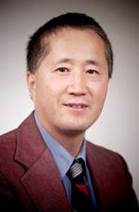 Peng Shireceived the Bachelor degree of Mathematics from Harbin Institute of Technology; the Master degree of Systems Engineering from Harbin Engineering University; China, respectively; the PhD degree in Electrical Engineering from the University of Newcastle; and the PhD degree in Mathematics from the University of South Australia, Australia, respectively. He was awarded the Higher Doctorate degree, Doctor of Science by the University of Glamorgan, UK in 2006, and Doctor of Engineering by the University of Adelaide, Australia in 2015.He is now a professor, Chair in Systems and Control, in the University of Adelaide, Australia. He was a professor in Victoria University, Australia; the University of Glamorgan, UK; and a senior scientist in the Defence Science and Technology Organisation, Australia. He was the Chair of Control Aerospace and Electronic Systems Chapter, IEEE South Australia Section. Currently he serves as an IEEE Distinguished Lecturer; and a College of Expert Member, Australian Research Council. He is a Fellow of the Institute of Electrical and Electronic Engineers, the Institution of Engineering and Technology; and the Institute of Mathematics and its Applications. He has actively served in the editorial board of a number of journals, including Automatica; IEEE Transactions on Automatic Control; IEEE Transactions on Cybernetics; IEEE Transactions on Fuzzy Systems; IEEE Transactions on Circuits and Systems; and IEEE Access. His research interests include system and control theory, intelligent systems, and operational research. He has been recognised as a Highly Cited Researcher by ISI Thomson Reuters in 2014, 2015 and 2016.
Peng Shireceived the Bachelor degree of Mathematics from Harbin Institute of Technology; the Master degree of Systems Engineering from Harbin Engineering University; China, respectively; the PhD degree in Electrical Engineering from the University of Newcastle; and the PhD degree in Mathematics from the University of South Australia, Australia, respectively. He was awarded the Higher Doctorate degree, Doctor of Science by the University of Glamorgan, UK in 2006, and Doctor of Engineering by the University of Adelaide, Australia in 2015.He is now a professor, Chair in Systems and Control, in the University of Adelaide, Australia. He was a professor in Victoria University, Australia; the University of Glamorgan, UK; and a senior scientist in the Defence Science and Technology Organisation, Australia. He was the Chair of Control Aerospace and Electronic Systems Chapter, IEEE South Australia Section. Currently he serves as an IEEE Distinguished Lecturer; and a College of Expert Member, Australian Research Council. He is a Fellow of the Institute of Electrical and Electronic Engineers, the Institution of Engineering and Technology; and the Institute of Mathematics and its Applications. He has actively served in the editorial board of a number of journals, including Automatica; IEEE Transactions on Automatic Control; IEEE Transactions on Cybernetics; IEEE Transactions on Fuzzy Systems; IEEE Transactions on Circuits and Systems; and IEEE Access. His research interests include system and control theory, intelligent systems, and operational research. He has been recognised as a Highly Cited Researcher by ISI Thomson Reuters in 2014, 2015 and 2016.
Title:Formation Control and Analysis of Multi-Robot Systems
Abstract:Multi-robot Systems are systems with characteristics of cooperation and decentralization. The robots in such systems could be working in a large area, where the dynamics of the robots can be approximated by first order equations. As the robots often work under complex circumstances, limitations of the hardware that include limited and short-range communication and short-range and passive sensing are likely to be present. As a result of the localization conditions above, the robots need to cooperate in a distributed manner. The fundamental objective for the system is to reach a desired formation of the robots and maintain the formation.
In this talk, the formation control problem for a team of robots will be investigated. We will consider the sensors on the robots have limited ranges, that could be limited or none communication among the robots; and the objective formation could have variable scales or in an arbitrary shape. The team size is scalable in the way that new robots could join in, and existing ones could leave. The arbitrary shape implies heavy computation burden and vulnerability to disturbances. In any situation, robots have to work independently in an interactive and cooperative manner. Control and protocol design will be introduced and analysed, and examples will be given to demonstrate the effectiveness of the proposed techniques.
ProfessorWanqing Song
Shanghai University of Engineering Sciences
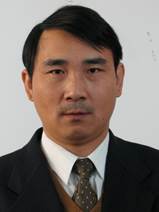 Professor Wanqing song got his PhD degrees in Control Theory and Control Engineering from Donghua University. His research Fields includes industry control, Mechanical & Electrical Integration, intelligent control algorithm, image process. In recent years, the research field includes the mechanical fault diagnosis and pattern recognition, time series analysis, vehicle tire dynamics analysis and modeling. 30 papers in journals and 10 papers in conferences have published, 20 papers in them is indexed by SCI and EI. In 2013 year, senior visiting scholar at Virginia Tech. In 2007-2009 year, invited to have lecture at university of Roma, University of Perugia, University of Salerno in Italy, respectively. Five items for invention patent and utility new type patent are granted. Two items for college students' innovative project and one item for graduate business program are granted by shanghai education commission, respectively. 2014, obtain one item for Shanghai nature science fund (Grant No. 14ZR1418500)
Professor Wanqing song got his PhD degrees in Control Theory and Control Engineering from Donghua University. His research Fields includes industry control, Mechanical & Electrical Integration, intelligent control algorithm, image process. In recent years, the research field includes the mechanical fault diagnosis and pattern recognition, time series analysis, vehicle tire dynamics analysis and modeling. 30 papers in journals and 10 papers in conferences have published, 20 papers in them is indexed by SCI and EI. In 2013 year, senior visiting scholar at Virginia Tech. In 2007-2009 year, invited to have lecture at university of Roma, University of Perugia, University of Salerno in Italy, respectively. Five items for invention patent and utility new type patent are granted. Two items for college students' innovative project and one item for graduate business program are granted by shanghai education commission, respectively. 2014, obtain one item for Shanghai nature science fund (Grant No. 14ZR1418500)
Title:Improved LMD, Permutation Entropy and Optimized K-Means to Fault Diagnosis for Roller Bearings
Abstract: A new bearing vibration signal fault feature extraction and recognition method based on the improved local mean decomposition (LMD), permutation entropy (PE) and the optimized K-means clustering algorithm is put forward in this paper. The improved LMD is proposed based on the self-similarity of roller bearing vibration signal extending the right and left side of the original signal to suppress its edge effect. After decomposing the extended signal into a set of product functions (PFs), the PE is utilized to display the complexity of the PF component and extract the fault feature meanwhile. Then, the optimized K-means algorithm is used to cluster analysis as a new pattern recognition approach, which uses the probability density distribution (PDD) to identify the initial centroid selection and has the priority of recognition accuracy compared with the classic one. Finally, the experiment results show the proposed method is effectively to fault extraction and recognition for roller bearing.Keywords: improved local mean decomposition; permutation entropy; optimizes K-means; fault extraction and recognition
Associate Professor Xiu Kan
Shanghai University of Engineering Sciences
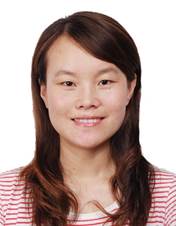
Xiu Kan received the B.Sc. degree in the School of Mathematics and Computer Science from Ningxia University, Yinchuan, China, in 2007, the M.Sc. Degree in the School of Science in 2009 and the Ph.D. Degree in School of Information Science and Technology from Donghua University, Shanghai, China, in 2013. Currently, she is a associate Professor of School of Electronic and Electrical Engineering at Shanghai University of Engineering Science. From October 2010–2011, she was a Visiting Ph.D. Student in the Department of Information Systems and Computing, Brunel University, U.K. Her research interests include nonlinear control and filtering, as well as complex networks and their applications. She is an active reviewer for many international journals.
Title: Distributed Filtering for Sensor Networks
Abstract: The talk is about recent advances on the distributed filtering for various plants over sensor networks. Considering the limited power and communication resources of the sensor nodes, the strategy of the distributed information processing is widely exploited. Therefore, it would be interesting to examine how the topology, network-induced phenomena, and power constraints influence the distributed filtering performance and to obtain some suitable schemes in order to solve the addressed distributed filter design problem. In addition, some latest results on the distributed filtering over sensor networks are discussed and some challenges are highlighted.


